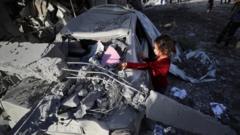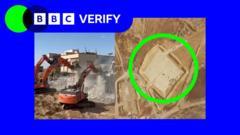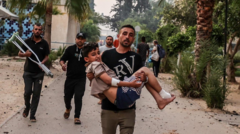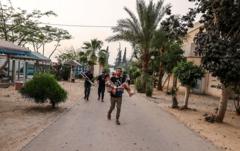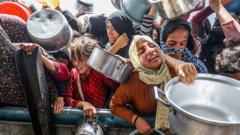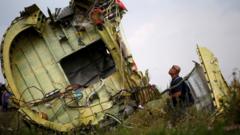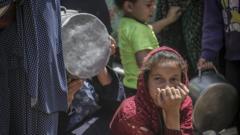As the conflict in Gaza intensifies, Israel's latest evacuation order highlights the dire situation for civilians sheltering in the region. Despite criticism from former officials and humanitarian advocates regarding the toll on Gaza's population, Israeli officials maintain that the actions are necessary to counter Hamas's influence. The humanitarian crisis continues to worsen, with calls for diplomatic solutions as casualties rise.
Israel Orders Evacuations in Gaza City Amid Heightened Military Operations
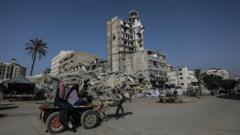
Israel Orders Evacuations in Gaza City Amid Heightened Military Operations
In a significant escalation of hostilities, Israel has issued a broad evacuation order for Palestinians in Gaza City, citing safety concerns amid intensified strikes.
In recent developments, Israel has implemented one of its most extensive evacuation orders for civilians residing in Gaza City, indicating an alarming intensification of military actions in the ongoing conflict. Residents in large parts of Gaza City, a previously bombarded area now identified as unsafe, have been warned to evacuate for their safety, particularly ahead of anticipated "intense strikes" by the Israel Defense Forces (IDF).
Among the sites highlighted in this order are key institutions like Al-Shifa Hospital and the Islamic University, which Israeli authorities claim are being utilized by Hamas for military operations. However, local authorities and humanitarian organizations emphasize that thousands of civilians are currently seeking shelter within these facilities, raising concerns about a potential humanitarian crisis should these areas be vacated rapidly.
Former Israeli Prime Minister Ehud Olmert stands out as a significant voice of dissent, publicly opposing the escalation of military operations. In remarks made to the BBC, Olmert criticized the ongoing conflict as damaging to Israel’s societal fabric, economy, and global reputation. He expressed urgency in addressing the humanitarian plight in Gaza, labeling the conditions as "intolerable" and "unacceptable." His statements, often overlooked in mainstream Israeli media, echo sentiments voiced by international leaders, including French President Emmanuel Macron, who condemned the actions of the Israeli government.
In the wake of a prolonged blockade that has lasted over ten weeks, there are increasing indications of widespread suffering among Gaza's estimated 2.1 million residents, compounded by a lack of essential food and medical supplies. A recent UN assessment marked the situation as "critical," highlighting risks of famine and the long-term impact on health and nutrition for the populace. Nevertheless, Israeli government spokesperson David Mencer refuted claims of famine, attributing hunger in Gaza to Hamas, rather than Israeli actions.
Military operations resumed on March 18, resulting in a significant uptick in casualties, with reports from the Hamas-run health ministry indicating 2,799 fatalities, including numerous deaths in recent airstrikes. Amidst these tensions, discussions regarding a potential ceasefire backed by the U.S. remain contentious, with Netanyahu vowing to continue military offensives despite increasing public pressure for a solution.
A recent survey revealed that a substantial majority of Israeli citizens support negotiating a hostage deal with Hamas, even if it necessitates ceasing military activities. While Netanyahu’s administration remains firm in its approach, the growing clamor for a diplomatic resolution, fueled by appeals from former hostages, is becoming more prominent. The situation continues to evolve as casualties mount and humanitarian needs escalate, underscoring the urgent need for a comprehensive peace initiative in the region.
Among the sites highlighted in this order are key institutions like Al-Shifa Hospital and the Islamic University, which Israeli authorities claim are being utilized by Hamas for military operations. However, local authorities and humanitarian organizations emphasize that thousands of civilians are currently seeking shelter within these facilities, raising concerns about a potential humanitarian crisis should these areas be vacated rapidly.
Former Israeli Prime Minister Ehud Olmert stands out as a significant voice of dissent, publicly opposing the escalation of military operations. In remarks made to the BBC, Olmert criticized the ongoing conflict as damaging to Israel’s societal fabric, economy, and global reputation. He expressed urgency in addressing the humanitarian plight in Gaza, labeling the conditions as "intolerable" and "unacceptable." His statements, often overlooked in mainstream Israeli media, echo sentiments voiced by international leaders, including French President Emmanuel Macron, who condemned the actions of the Israeli government.
In the wake of a prolonged blockade that has lasted over ten weeks, there are increasing indications of widespread suffering among Gaza's estimated 2.1 million residents, compounded by a lack of essential food and medical supplies. A recent UN assessment marked the situation as "critical," highlighting risks of famine and the long-term impact on health and nutrition for the populace. Nevertheless, Israeli government spokesperson David Mencer refuted claims of famine, attributing hunger in Gaza to Hamas, rather than Israeli actions.
Military operations resumed on March 18, resulting in a significant uptick in casualties, with reports from the Hamas-run health ministry indicating 2,799 fatalities, including numerous deaths in recent airstrikes. Amidst these tensions, discussions regarding a potential ceasefire backed by the U.S. remain contentious, with Netanyahu vowing to continue military offensives despite increasing public pressure for a solution.
A recent survey revealed that a substantial majority of Israeli citizens support negotiating a hostage deal with Hamas, even if it necessitates ceasing military activities. While Netanyahu’s administration remains firm in its approach, the growing clamor for a diplomatic resolution, fueled by appeals from former hostages, is becoming more prominent. The situation continues to evolve as casualties mount and humanitarian needs escalate, underscoring the urgent need for a comprehensive peace initiative in the region.



